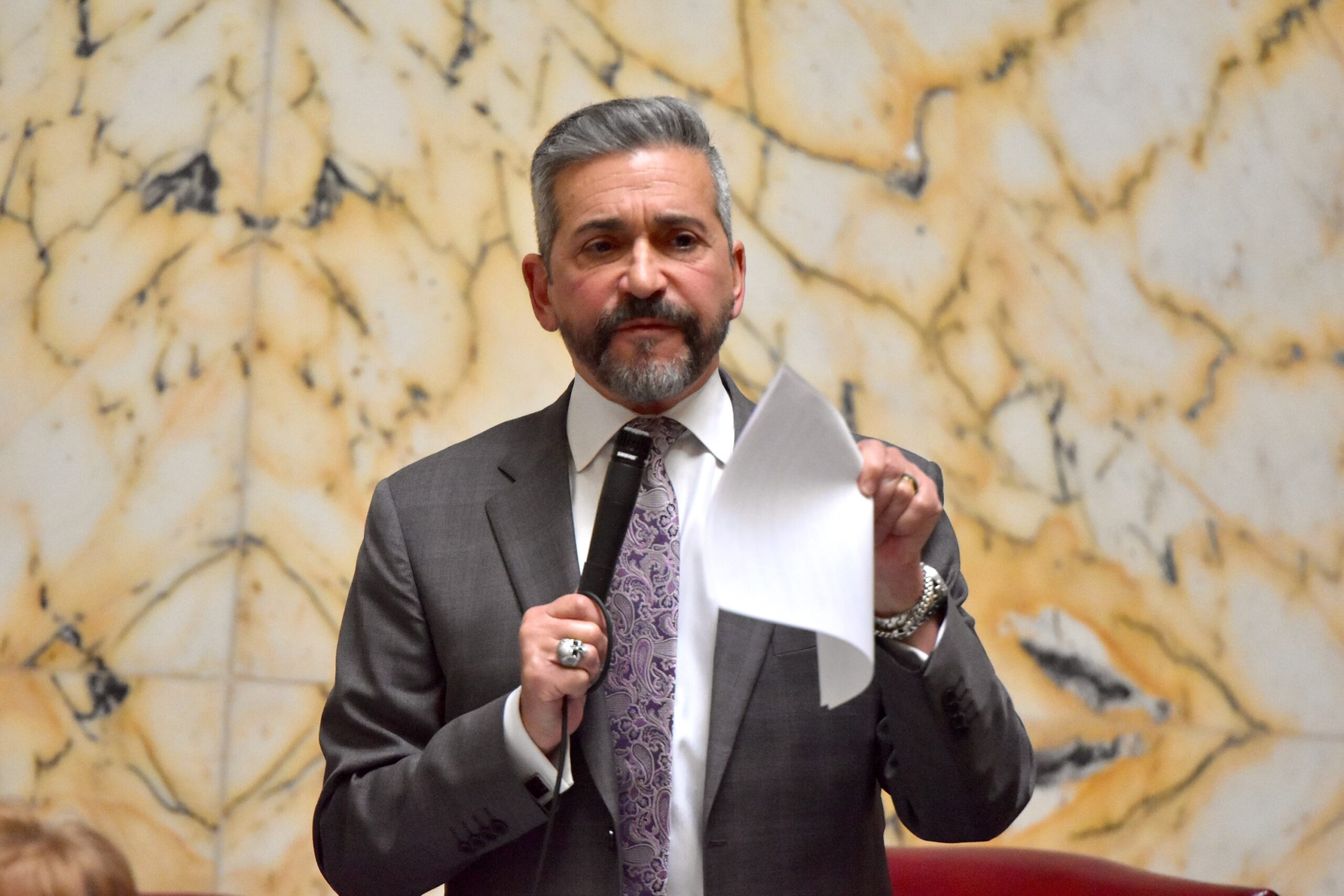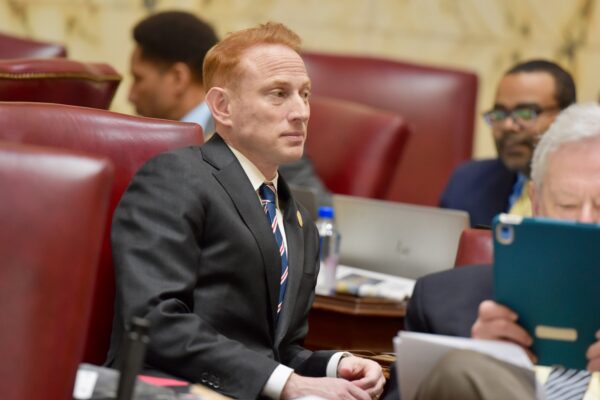A tidy ‘Crossover Day’ produces progress and flashes of dissent

“Crossover Day” in the Maryland General Assembly, a key deadline for legislation to be approved, passed Monday with surprisingly little drama and without the marathon floor sessions the day often requires.
The House of Delegates, which came in for its first of two floor sessions at 10 a.m., finished its second just before 5 p.m. The state Senate, which gaveled in around 2:15 p.m. for its first floor session, finished its second around 8:55 p.m.
Both chambers churned through dozens of bills — the count in the House approached 200. But none of Monday’s action changed the flow or narrative of the legislative session so far.
The fates of some important bills — including a fight between the House and Senate over taxes and new revenue sources — remain to be resolved in the session’s final 21 days, but even those battles may turn out to be mild compared to prior years.
Officially, Crossover Day is the deadline for bills to pass one chamber of the legislature and be guaranteed a hearing and consideration in the other. But it’s not a drop-dead deadline: Legislation can move any time between now and the legislature’s adjournment at midnight on April 8, depending on the will of lawmakers — and especially the marching orders of their presiding officers.
Gov. Wes Moore (D) is already preparing to take a victory lap over the progress of his agenda this session. As of Monday, 15 of his 16 priority bills had passed at least one chamber, and administration officials were expressing confidence that the last item, a planning and zoning bill that’s part of his affordable housing initiative, will pass soon. Debates over housing measures took up significant floor time in the House of Delegates Monday.
Moore’s other initiatives are meant to address economic development and innovation, child poverty, mental health, military families, and safety for elections officials and highway construction workers.
“We are feeling great,” Eric Luedtke, the governor’s chief legislative officer said in a statement Monday.
Legal liability cap vexes Senate
The Senate’s evening session was dominated by debate over a bill that would almost double the liability cap on noneconomic damages a plaintiff can collect in civil lawsuits. It was a rare instance where some powerful Democrats teamed with Republicans to oppose the bill — but not enough to kill it.
The current limit on those caps, which cover hard-to-measure losses like pain and suffering, is $935,000 — a figure that goes up by $15,000 every year.
Economic damages collected from a lawsuit — the loss of income, or to seek reimbursements for medical payments caused by an accident — are not subject to a cap in Maryland.
The bill as originally written by Sen. Jeff Waldstreicher (D-Montgomery) would have lifted the caps for noneconomic damages altogether. The Senate Judicial Proceedings Committee, where Waldstreicher is vice chair, amended the bill late last week, so that the cap would rise to $1.75 million, and the annual “escalator” would increase to $20,000.

Sen. Jeff Waldstreicher (D-Montgomery). Photo by Bryan P. Sears.
On the Senate floor Monday night, Waldstreicher repeatedly described the legislation as an equity measure, designed to help women and people of color who by tradition might not be able to collect economic damages at the same rate as white males. The bill is designed “to better compensate people for the pain and suffering they are experiencing,” he said.
But Senate Finance Committee Chair Pam Beidle (D-Anne Arundel) warned that the bill, if passed, would inevitably lead to higher insurance rates for consumers — who might hold state lawmakers accountable.
“If we pass the bill, be prepared,” she said.
Beidle and Senate Minority Leader Stephen S. Hershey Jr. (R-Upper Shore) noted that an array of business groups testified against the bill, while only the Maryland Association for Justice — the trial lawyers’ organization — testified for it.
“I think it’s pretty clear why we just saw one group of people testifying in favor of this bill,” Hershey said.
Eventually, the bill passed, 27-18, with a handful of Democrats joining Republicans in opposition.
The House equivalent, sponsored by Del. Natalie Ziegler (D-Howard and Montgomery), has yet to be voted out of the Judiciary Committee.
Asked late last week whether the House panel would be willing to accept any compromise that emerged from the Senate, Judiciary Vice Chair J. Sandy Bartlett (D-Anne Arundel) thought for a moment and replied, “Probably.”
Vanquishing vapes
The final bill passed in the Senate on Crossover Day aims to curb the sale of vaping products for minors and those under the age of 21.
Sen. Benjamin F. Kramer (D-Montgomery) sponsored SB 1056, which he says “takes a significant step toward improving the lives of our children by limiting their access to tobacco, including vape products.”
The bill increases the fee on licenses to sell tobacco products. The increased funds would then go towards enforcement of federal and state laws that prohibit people under the age of 21 from purchasing tobacco products. The House version, HB 1180, has not received a vote out of the Economic Matters Committee.
The biggest point of contention in the bill is a measure that would restrict the sale of electronic smoking devices, also known as “vaping products,” only to vape stores, meaning that gas stations and convenience stores would no longer be able to sell vape products, even though they could continue selling tobacco products.
Hershey argued that the legislation creates a “monopoly” for vape stores, as the bill would clear out the competition from gas stations and other electronic smoking devices retailers.
He also asked if there was a possibility that because gas stations and convenience stores are more numerous than vape shops, that more Marylanders will turn to cigarette smoking when it’s harder to access vaping products.
“I think there’s a concern about changing too much that this goes the opposite way,” Hershey said.
Republican senators offered amendments to loosen the restrictions proposed within the bill, but none passed.
As Monday afternoon turned to early evening, Kramer expressed frustration with the discussion.
“Colleagues. My apologies that we have to continue this conversation,” he said in response to one of Hershey’s proposed amendments, which would have negated the restriction of vape product sales to only vape stores. “We have an epidemic of youth vaping in our state.”
“I really hoped we were going to come here tonight and just do the right things. That we would value our children and our families to a greater extent than the big tobacco industries,” he continued. “That’s what I was hoping. Maybe I was naïve.”
The debate lasted for almost 50 minutes before senators took a break for dinner. When they returned for the second session of the day shortly after 7 p.m., the Senate passed HB 1056 on a 32-13 vote, ending official business on Crossover Day.
Waving the white flag
One issue losing steam this session is an effort to expand the authority of a state board tasked with constraining the costs of prescription drug prices, known as the Prescription Drug Affordability Board (PDAB).
The board is currently authorized to look for ways to reduce drug costs on the state health care plan through a variety of means, including setting what are called “upper payment limits.”
SB 388 and HB 340 would have allowed PDAB to issue upper payment limits or consider other methods that may work to reduce drug prices for those not on the state plan.
Despite receiving support from the Maryland Legislative Black Caucus and endorsements from various medical advocacy groups, bill sponsors and advocates suggest that the 2025 session will be a more advantageous year for the legislation, according to a Monday news release from Maryland Health Care for All, an advocacy group that is one of the most vocal supporters of the legislation.
“The General Assembly will wait until 2025 to consider this legislation, which gives the Board time to finalize action on upper payment limits for drugs purchased by state and local governments,” said Sen. Dawn Gile (D-Anne Arundel), sponsor of the Senate bill, said in a written statement.
“There is widespread agreement in the General Assembly that we need to help bring down the costs of expensive prescription drugs. Waiting until next year is the right decision and gives the Board time to fulfill its existing mandate,” she said.
Vincent DeMarco, president of Maryland Health Care for All, says that the organization looks forward to working with the legislature next year on the issue.
“Although we are disappointed that the General Assembly did not expand the Board’s authority this year, after the Board makes high cost drugs more affordable for state and local governments in the next few months, we will work hard to ensure that the Maryland General Assembly will in 2025 expand the Board’s authority to allow it to make high cost drugs more affordable for all Marylanders,” he said.





 Creative Commons Attribution
Creative Commons Attribution